Polycystic kidney disease
- Reviewed by Howard E. LeWine, MD, Chief Medical Editor, Harvard Health Publishing; Editorial Advisory Board Member, Harvard Health Publishing
What is polycystic kidney disease?
Polycystic kidney disease causes numerous cysts (non-cancerous growths) to form in both kidneys. It is a genetic disease, meaning you inherit it from your parents. About 600,000 Americans have polycystic kidney disease.
The kidneys are a pair of bean-shaped organs that sit in the upper part of the abdomen. They filter wastes and extra fluid from the blood, which get passed out of the body in the form of urine. The kidneys also regulate the amount of certain vital substances in the body, such as electrolytes.
When polycystic kidney disease causes numerous cysts to form in the kidneys, the kidneys get severely enlarged, and the cysts also take the place of normal kidney tissue. With less normal kidney tissue, the kidneys cannot function as well, and eventually the kidneys may fail. Cysts normally form in the kidneys as people age, but with polycystic kidney disease there are many more cysts than normal, and they cause problems in the body.
In about half of people with the most common type of polycystic kidney disease, the kidneys eventually fail. When that happens, the patient needs to get a kidney transplant or needs to go on regular dialysis, where a machine acts as the kidney and filters the blood. Usually a person can live with polycystic kidney disease for many years before the kidneys fail.
Though its name makes it sound like it only affects the kidneys, polycystic kidney disease can also cause cysts in the liver and pancreas. It can also cause problems in other organs, such as aneurysms in the brain (bulges in the walls of blood vessels, which can leak and cause a stroke).
There are two major types of polycystic kidney disease:
- Autosomal dominant polycystic kidney disease. This is the most common form, making up about 90% of all cases of polycystic kidney disease. If one of your parents has this disease, you have a 50% chance of inheriting it.
- Autosomal recessive polycystic kidney disease. This is a rare form of the disease. It can occur when two people who carry the gene for the disease have children. The parents don't have the disease themselves, and probably don't know they are carrying the problematic gene. It only occurs in one-fourth of the children of couples who both carry the gene.
Symptoms
Autosomal dominant polycystic kidney disease
The two most common symptoms are headaches and pain in the back and the sides, between the ribs and hips. The pain may be mild or severe; it may come and go or be persistent.
Autosomal dominant polycystic kidney disease can also cause
- urinary tract infections
- blood in the urine (hematuria)
- high blood pressure
- kidney stones.
Many people live with autosomal dominant polycystic kidney disease for several decades before symptoms develop. For this reason, you may hear the disease referred to as "adult polycystic kidney disease."
Autosomal recessive polycystic kidney disease
Autosomal recessive polycystic kidney disease often causes symptoms in babies even before they are born. For this reason, it is often called "infantile PKD." Children with this disease often experience:
- high blood pressure
- urinary tract infections
- frequent urination
- low blood cell counts
- varicose veins
- hemorrhoids
- growth problems or smaller than average size
- kidney failure during childhood.
The severity of autosomal recessive polycystic kidney disease varies. It can cause death in babies with the most severe forms, while other people live with it into adulthood without experiencing any symptoms.
Diagnosing polycystic kidney disease
Doctors use imaging studies to diagnose both types of polycystic kidney disease, usually ultrasound. Ultrasound uses sound waves to produce images of structures inside the body. On an ultrasound, a doctor can spot cysts on the kidneys that are one-half inch or bigger. Doctors can also use other imaging tests, such as computerized tomography (CT) scans and magnetic resonance imaging (MRI). MRI can measure the volume of cysts, and may help doctors track the progression of the disease.
Through blood tests, doctors can look for genetic mutations that are known to cause polycystic kidney disease. This test can diagnose the autosomal dominant version of the disease before large cysts develop, allowing someone with a mutation to do their best to preserve kidney function by eating well and keeping blood pressure under control. However, the test cannot predict when symptoms will start or how severe the disease will be. The test can be used by people with a family history of polycystic kidney disease to see if they will pass the gene on to their children.
Expected duration of polycystic kidney disease
Polycystic kidney disease is a life-long condition, but the severity of the disease varies a lot from person to person.
Preventing polycystic kidney disease
Since polycystic kidney disease is a genetic disease, there is nothing you can do to prevent it. Whether you get it is purely a matter of what genes you inherit from your parents.
Treating polycystic kidney disease
Since polycystic kidney disease is a genetic disease, there is nothing you can do to prevent it. Whether you get it is purely a matter of what genes you inherit from your parents.
Pain
Over-the-counter pain medications can help ease pain in the abdomen. Note, though, that it is important to talk to your doctor about which pain medications you should use — some over-the-counter and prescription pain medications can damage the kidneys. Surgery to shrink the cysts can also relieve pain.
If you have severe or recurring headaches, see your doctor before you try to treat them with over-the-counter medication. Headaches can be caused by high blood pressure, which would need to be treated in order to cure the headaches and prevent other health problems. A very severe headache might be caused by an aneurysm in the brain. An aneurysm is a medical emergency that requires immediate treatment.
Urinary tract infections
Antibiotics can treat urinary tract infections (UTIs), which occur frequently in people with polycystic kidney disease. If you have symptoms of a UTI, such as pain when you urinate or a frequent urge to urinate, see your doctor immediately. The infection needs to be treated quickly to prevent it from spreading from the urinary tract to the cysts in the kidneys, where infections are harder to treat.
High blood pressure
Keeping blood pressure under control is especially important for people with autosomal dominant polycystic kidney disease because it can slow the disease's effects on the kidneys. Eating a low-fat, low-salt diet rich in fruits, vegetables, whole grains, and low-fat dairy products can help lower blood pressure. Also you should avoid tobacco products and exercise regularly.
Medication is often needed for blood pressure control. The most effective treatment for people with this disorder is an angiotensin converting enzyme inhibitor (ACE inhibitor) or angiotensin receptor blocker (ARB). If blood pressure is still high, a diuretic and/or beta blocker can be added.
Fluid intake
There is some evidence that a very high total daily fluid intake, at least three liters per day, may slow progression of the condition. However, given that people are also restricting sodium intake, periodic blood tests to measure sodium concentration should be done to avoid a dangerously low level (hyponatremia).
Tolvaptan
Tolvaptan may be considered for some adults with autosomal dominant polycystic kidney disease. This medication blocks can potentially help slow the formation of cysts and the progression of kidney damage.
Kidney failure
Polycystic kidney disease can eventually cause the kidneys to fail. When the kidneys stop working, either dialysis or kidney transplant is needed so that toxins continue to get filtered out of the blood. A person cannot live without this filtering activity.
Dialysis can be done in one of two ways, and it needs to be done regularly and continuously until a kidney transplant takes place.
- In hemodialysis, the patient is hooked up to a dialysis machine, and the blood circulates through an external filter. The clean blood reenters the body.
- In peritoneal dialysis, a cleansing solution is infused daily into the abdomen. The solution stays in the abdomen for several hours, and then it drains out, along with waste products. Most people do this at night while asleep.
Surgery that transplants a healthy kidney into a person with polycystic kidney disease is the preferred treatment for kidney failure. After a transplant, cysts will not develop on the new, healthy kidney. However, receiving an organ transplant means that you need to take drugs to suppress the immune system for the rest of your life in order to prevent your body from rejecting the transplanted organ. These drugs make you more likely to get infections.
Growth problems
In children with autosomal recessive polycystic kidney disease, eating increased amounts of nutritious food can improve growth. Growth hormone may also be used.
When to call a professional
If you have pain in the abdomen, especially if it's accompanied by painful urinations or blood in the urine, see your doctor. If your baby has high blood pressure and pain or blood when urinating, tell your pediatrician. If you have polycystic kidney disease and experience a sudden severe headache, you need immediate medical evaluation to be sure this is not related to a brain aneurysm.
Prognosis
People with polycystic kidney disease can live for decades without it causing serious kidney problems. Keeping blood pressure under control by having a healthy lifestyle or taking medications can help ward off serious problems. However, especially with autosomal recessive polycystic kidney disease, the disease's severity varies from person to person.
Additional info
American Association of Kidney Patients
www.aakp.org
National Kidney Foundation
www.kidney.org
National Kidney and Urologic Diseases Information Clearinghouse
https://www.niddk.nih.gov/health-information/kidney-disease
Polycystic Kidney Disease Foundation
www.pkdcure.org
About the Reviewer

Howard E. LeWine, MD, Chief Medical Editor, Harvard Health Publishing; Editorial Advisory Board Member, Harvard Health Publishing
Disclaimer:
As a service to our readers, Harvard Health Publishing provides access to our library of archived content. Please note the date of last review or update on all articles.
No content on this site, regardless of date, should ever be used as a substitute for direct medical advice from your doctor or other qualified clinician.















